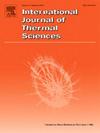Experimental study on the transient heat transfer performance of spray cooling during swing excitation
IF 4.9
2区 工程技术
Q1 ENGINEERING, MECHANICAL
International Journal of Thermal Sciences
Pub Date : 2025-01-31
DOI:10.1016/j.ijthermalsci.2025.109750
引用次数: 0
Abstract
The experimental study examines the transient heat transfer performance of spray cooling when subjected to swing excitation, utilizing a swinging spray cooling apparatus. The findings suggest that the transient heat transfer process of spray cooling can be divided into two stages: rapid cooling and slow cooling. The major heat dissipation primarily occurs during the rapid cooling stage.
In transient heat transfer processes, applying swinging excitation to the spray chamber also leads to liquid accumulation inside. Increasing the swing amplitude(0° to ±135°) and reducing the swing frequency (1.5–0 Hz) both result in greater liquid accumulation depth, although this depth is significantly lower compared to the amount of liquid accumulation under steady heat transfer conditions at the same operating conditions. A moderate level of liquid accumulation can enhance heat transfer during the rapid cooling phase. However, during the slow cooling phase, when there is a higher level of liquid accumulation, it leads to an increase in convective heat transfer resistance, exacerbating the fluctuations in the cooling curve during this period. Increasing the flow rate (0.46–1.16 L/min) and decreasing the spray height (54.7–14.7 mm) prove beneficial in enhancing the heat transfer performance of spray cooling.
求助全文
约1分钟内获得全文
求助全文
来源期刊

International Journal of Thermal Sciences
工程技术-工程:机械
CiteScore
8.10
自引率
11.10%
发文量
531
审稿时长
55 days
期刊介绍:
The International Journal of Thermal Sciences is a journal devoted to the publication of fundamental studies on the physics of transfer processes in general, with an emphasis on thermal aspects and also applied research on various processes, energy systems and the environment. Articles are published in English and French, and are subject to peer review.
The fundamental subjects considered within the scope of the journal are:
* Heat and relevant mass transfer at all scales (nano, micro and macro) and in all types of material (heterogeneous, composites, biological,...) and fluid flow
* Forced, natural or mixed convection in reactive or non-reactive media
* Single or multi–phase fluid flow with or without phase change
* Near–and far–field radiative heat transfer
* Combined modes of heat transfer in complex systems (for example, plasmas, biological, geological,...)
* Multiscale modelling
The applied research topics include:
* Heat exchangers, heat pipes, cooling processes
* Transport phenomena taking place in industrial processes (chemical, food and agricultural, metallurgical, space and aeronautical, automobile industries)
* Nano–and micro–technology for energy, space, biosystems and devices
* Heat transport analysis in advanced systems
* Impact of energy–related processes on environment, and emerging energy systems
The study of thermophysical properties of materials and fluids, thermal measurement techniques, inverse methods, and the developments of experimental methods are within the scope of the International Journal of Thermal Sciences which also covers the modelling, and numerical methods applied to thermal transfer.
 求助内容:
求助内容: 应助结果提醒方式:
应助结果提醒方式:


